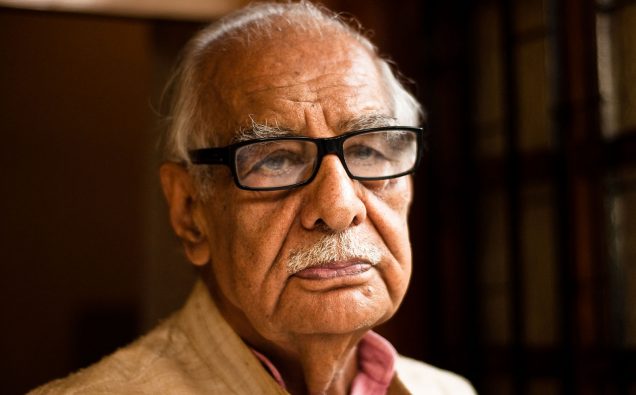
Kuldip Nayar, a fearless proponent of peace between Pakistan and India, left the world Thursday as an intellectual who defended human rights indiscriminately, looked inwardly and often rose above narrow nationalistic fervor to voice candid opinions.
I cherish the conversation I was lucky to have with this Indian icon and giant of journalism in South Asia. It was nearly a decade ago, when the Nayyar was visiting Washington D.C. as one of the lead speakers at a Kashmir conference held on the Capitol Hill.
Like many of my fellow journalists, I had read several of his columns previously and known about his unswerving advocacy for peace, human rights and democratic freedoms as well as his criticism of both Pakistan and India on many issues including the Jammu and Kashmir dispute.
But what struck me the most during our conversation was Nayar’s candor, forthright expressions, and a deep sense of association with his ancestral home. Sialkot and Lahore, where he grew up and studied before the 1947 independence of India and Pakistan, were his hometowns.
When I told him that I also belonged to the same city, he fondly recalled where his family lived in Sialkot.
He reminisced how he knew the area where his family lived, the lively Trunk Bazaar in the heart of the city, then a clean town with green fields and cold flowing waters of River Chenab. Nayyar who spent his formative years and youth in Sialkot and Lahore also remembered the way people would know each other and lived together.
It was clear that he loved and missed the city of his birth and its people, despite decades of life spent in other parts including much of the professional life in capital New Delhi. Perhaps it was natural for him to feel for both countries, India and Pakistan. Both were indispensable part of his being. And he never shied away from talking peace for both.
Pakistan senator and former minister Mushahid Hussain Sayed, while condoling the demise of 95-year-old journalist, called Nayar the “best friend of Pakistan in India.”
Champion of our democratic rights, civil liberties and at the forefront of those battles, Kuldip Nayar served India with distinction. His advocacy of people to people ties with Pakistan was special. His presence in current battles would have been a source of strength. Condolences pic.twitter.com/6FbLc5NNdP
— Sitaram Yechury (@SitaramYechury) August 23, 2018
A look at the monumental legacy Nayar leaves behind after decades of struggles and writings, his contributions to understanding on several momentous moments stand out for South Asia watchers, readers of international relations and some of the complex challenges confronting India and Pakistan.
For example, he stoutly resisted the then prime minister Indra Gandhi’s gagging Emergency rule during the 1975-77 year, a stance for which he was jailed.
It was through Nayar’s writings that we came to know how former Indian prime minister Narasimha Rao feigned ignorance under the cover of going into a worshipping pause, while extremists razed the Babri Mosque to ground in Ayodhia in 1992. The demolition of the mosque stabbed Indian secularism deep into the heart.
Then more recently, Nayar had been a critic of Prime Minister Narendra Modi’s Hindutva ideology. “People are very afraid to speak,” he said this summer, according to newspaper The Telegraph.
He even poked the Indian Press in the face of extremist violence being perpetrated by extremist organizations espousing Hindutva and supporting Modi’s discriminatory thinking.
“In the press, I do not find any discordant voices. Why don’t journalists speak out?” he questioned.
Kuldip Nayar was a regular visitor to Pakistan during his lifetime, he was close to several Pakistan leaders including Zulfikar Ali Bhutto & General Zia; his column, ‘Between The Lines’ was extremely influential & his book, ‘Distant Neighbours’, summed up Pakistan-India relations
— Mushahid Hussain (@Mushahid) August 23, 2018
In Pakistan, Nayar became famous for an interview when he got news about Pakistan’s being nuclear capable in 1987.
Since Kuldip Nayar wrote so much about human rights and political issues, he was not liked by many in India.
He was part of the delegation that the late prime minister Atal Behari Vajpayee – who died this month – led with a bold peace initiative for the two countries. The bus travel across the Wagah border into Lahore for a meeting with the then prime minister Nawaz Sharif and the Lahore Declaration in 1999 had raised hopes for peace between the two nuclear-armed neighbors.
Kuldip Nayar’s passing away on Thursday takes away from South Asia a powerful voice for peaceful relations at a time when the new Pakistani Prime Minister Imran Khan has held out peace overtures to the nationalist and far-right leader Modi, and the teeming millions trapped in poverty need peace advocates, not war drummers.
















